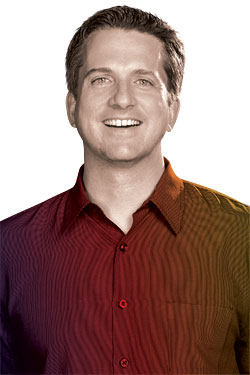
For this week’s magazine, Will Leitch talked to ESPN.com super-columnist Bill Simmons, whose new book, The Book of Basketball, hit shelves yesterday. We’re running three expanded sections from the interview this week. Part Two will run Tuesday.
Not many people realize that the 30 for 30 thing was originally your idea. How did that happen?
It was somewhere in the February–April range of 2007. I had agreed to terms with ESPN in January 2007, and part of the contract was that I was going to get a lot more involved in the television side, in terms of creating programs and coming up with ideas for shows. I didn’t understand why we had conceded the documentary territory to HBO. We were still making a ton of documentaries, but we were almost making too many. And they were on too many different channels, and there was no way for our viewers to differentiate what was really good, and what was a run of the mill SportsCentury or whatever. So basically I came up with this idea. I knew our anniversary was coming, it was 30 years in 2009, September. So that made me think, “we love celebrating anniversaries, we love pointing the finger at ourselves, getting excited,” so that was good.
It basically kind of evolved from there. [30 for 30 co-producer] Connor Schell took the idea and ran with it, with the indie-film model, basically having 30 films made by filmmakers. So we started meeting and making lists — who do we want to be on it, what topics do we want to hit, and so on, and so on. This is kind of the beauty of that division, that people are working on ideas all the time, but because of the realities of ESPN and the realities of where television is going, a lot of those ideas don’t get made. I think over the last five or six years, ESPN kind of realized, “maybe we’re better off showing games, maybe we’re better off not making movies, maybe we’re better off not doing Playmakers.” So I really didn’t think it was going to happen; I thought for sure the plug was going to get pulled. But the guy who runs ESPN, John Skipper, for whatever reason, this just became really important to him. And I think he considers this part of his legacy someday, that this happened on his watch. Every time it seemed like it was going to die, it didn’t.
It just seems so unlike anything ESPN would ever do.
I think ESPN takes some heat with stuff, and people seem to think that we are more nefarious than maybe we are. People seem to be disappointed in ESPN a lot, and there’s a lot of complaining. I think this is a case where all of it is good. I really don’t see how anybody could be against any of this. Basically, we spent a lot of money to give all the creative control to other people, we haven’t meddled with them, we’re not interfering. We’ve just basically trusted that they would deliver this creative entity. I think that’s some pretty good stuff for ESPN. I don’t think they would’ve been able to do that five years ago.
Why have they taken this sort of risk?
I think the two spots that Skipper thought he could really have a chance to make an impact were with the website and the magazine. “Can we beat Sports Illustrated? Can we beat Yahoo!? Can we be the No. 1 place for people for sports?” And then with documentaries: “Why when HBO releases a documentary does it feel like a big deal?” That’s something we couldn’t get our heads around, because HBO is not a sports company, it’s a movie company. So why do they get this territory and we don’t? So then the question became: “How do we go about changing that?”
And now the Boston Sports Guy is a movie producer.
What it’s turned into is something that’s really never been done before. Now we have re-established ourselves, not just with documentaries, but in Hollywood. ESPN has become this place where everybody who knew about the Playmakers thing, or people who had heard horror stories … they know we’re players now. We’ve made so many contacts now that whatever kind of projects we want to do next … I think we’ve legitimized ESPN, and maybe I guess me and Connor, as well; [we’ve shown] some of the other people that have worked on this project that this happens. ESPN did this; it spent the money; it’s gonna promote the living hell out of it; and I think we have a lot more leeway in Hollywood that we didn’t have three years ago.
Part Two runs Tuesday.
